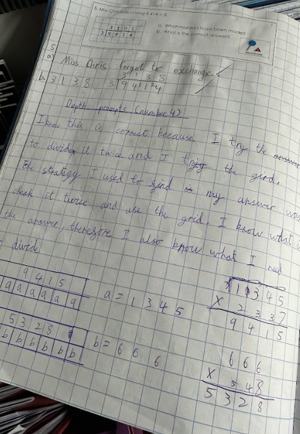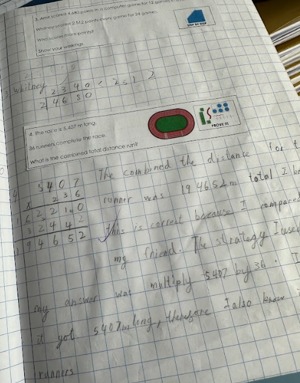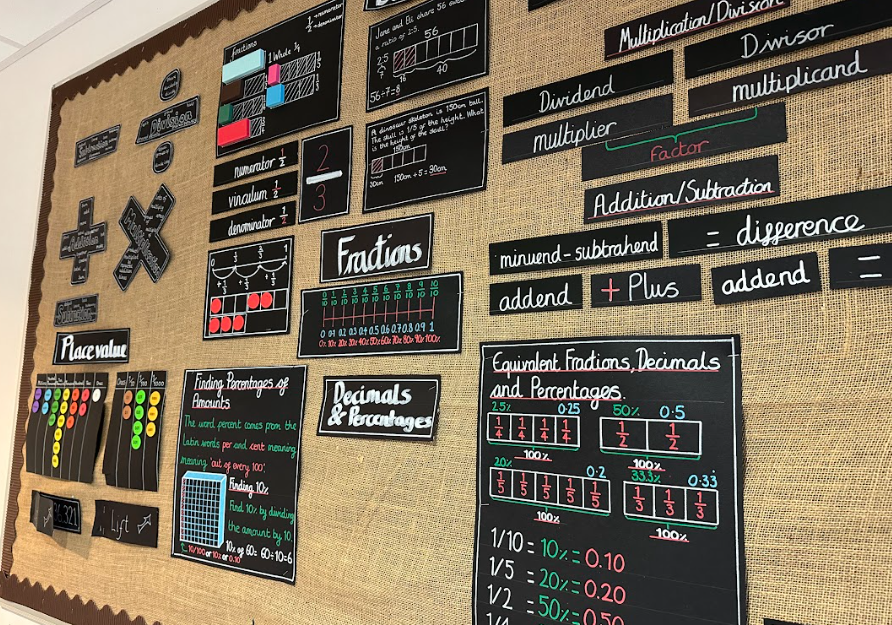Maths
Intent
At Ascot Road Primary, we are committed to delivering mathematics through a mastery curriculum. We aim to help our pupils develop a deep and long lasting understanding of mathematical procedures and concepts. Mastery encourages learning behaviours that promote reasoning and push pupils to seek connections. We believe that this approach maximises our pupils’ chances of success.
Through our mathematics curriculum we aim to:
-
Teach and deliver the curriculum in such a way that all pupils can engage, learn and enjoy mathematics.
-
Help our pupils to develop a deep understanding of mathematics, not just at the surface level.
-
Encourage our children to become problem solvers, capable of using what they know to discover what they don’t.
-
Use carefully selected examples, representations and models to expose the structure of mathematical concepts and emphasise connections, enabling pupils to develop a deeper knowledge of mathematics.
-
Develop procedural fluency and conceptual understanding in tandem, with both helping the development of the other.
-
Deliver lessons with back and forth interaction, including questioning, short tasks, explanation, demonstration and discussion.
-
Enable pupils to think, reason and apply their knowledge to solve problems.
Implementation
Mathematics at Ascot Road Primary is planned, delivered and supported through the White Rose curriculum.
Key Stage 1:
Each term is broken down into 12 weeks and from there into blocks. Each block consists of learning objectives, with a view to teaching mathematics in small steps so no one is left behind. In the Autumn term Year 1s learn about Place value, addition and subtraction, geometry (shape) and then have one week for consolidation. In the Spring term, they then revisit place value and addition and subtraction, and then are introduced to length and height and mass and volume. Finally, the summer term consists of six blocks: multiplication and division, fractions, geometry, place value, measurement and time.
Supporting each block is Fluent in Five and Flashback Four, which aim to help pupils recap their previous learning, keeping it fresh in their minds.
In Autumn term, Year 2 builds upon what they have learnt the previous year: place value, addition and subtraction and shape. In the Spring term learn about money, multiplication and division, length and height and mass, capacity and temperature. The summer term sees the pupils revisit fractions, whilst introducing time, statistics and position and direction. Again, each block is supported with Fluent in Five and Flashback Four.
*At the start of the new school year, 24/25, we will be introducing the NCETM’s Mastering Mathematics initiative. The school has been selected to take part in the scheme, which aims to support and work alongside the current curriculum. The aim is to help improve our pupils procedural fluency as they move forward through the school and into KS2.
 Key Stage 2
Key Stage 2
In KS2, our curriculum is still supported and planned using White Rose Mathematics. Our approach is still teaching in small steps, spending significant time developing a deep understanding of key ideas.
Year 3
Autumn Term: Place value; addition and subtraction; multiplication and division A.
Spring Term: Multiplication and division B; length and perimeter; fractions A; mass and capacity.
Summer Term: Fractions B; money, time; shape; statistics.
Year 4
Autumn term: Place value; addition and subtraction; measurement; multiplication and division A.
Spring Term: multiplication and division B; length and perimeter; fractions; decimals A.
Summer Term: Decimals B; money; time; shape; statistics; position and direction.
Year 5
Autumn term: Place value; addition and subtraction; multiplication and division A; fractions A.
Spring Term: Multiplication and division B; fractions B; decimals and percentages; perimeter and area; statistics.
Summer Term: Shape; position and direction; decimals; negative numbers; converting units; measurement.

Year 6
Autumn term: Place value; addition, subtraction, multiplication and division; fractions A; fractions B; measurement.
Spring Term: Ratio; algebra; decimals; fractions, decimals and percentages; area, perimeter and volume; statistics.
Summer Term: Shape; geometry; themed projects, consolidation and problem solving.
Impact
Upon leaving Ascot Road, children will have gained and developed a deep understanding of mathematics and mathematical concepts.
They will be able to:
-
Use precise mathematical language, enabling them to communicate their reasoning and thinking effectively.
-
Use a deep understanding of the key ideas that underpin future learning.
-
Use key number facts, that have been learnt to automaticity, and other key mathematical facts are learned deeply and practised regularly, to avoid cognitive overload in working memory and enable pupils to focus on new learning.
-
engage fully as learners who reason and seek to make connections.
-
think, reason and apply their knowledge to solve problems.
We aim to ensure that our pupils leave Ascot Road with the knowledge and deep understanding of mathematics that prepares them for secondary school.
what does Maths look like in Reception?
The first and most crucial step in responding to pupils who have SEND is inclusive high-quality teaching. Mastery in mathematics ensures that planning and implementation meet the needs of all our learners. It also builds high expectations for all our learners.
SEND pupils are supported through scaffolded learning (which still encourages mathematical thinking, reasoning and making connections), inclusive learning environments, 1-1 support, key vocabulary word maps, targeted interventions, engagement through a hands-on approach to mathematics.
How are children with SEND supported in Maths?
The first and most crucial step in responding to pupils who have SEND is inclusive high-quality teaching. Mastery in mathematics ensures that planning and implementation meet the needs of all our learners. It also builds high expectations for all our learners.
SEND pupils are supported through scaffolded learning (which still encourages mathematical thinking, reasoning and making connections), inclusive learning environments, 1-1 support, key vocabulary word maps, targeted interventions, engagement through a hands-on approach to mathematics.
Culture
Our school fosters a culture of mathematics through:
- Connections with our local maths hubs, providing CPD for our teachers
-
Working walls in all classrooms that enable pupils and teachers to refer back to previous learning
-
Primary Maths Challenge
-
Within our lessons you will see cross-curricular links (Science, D&T, Art etc)
-
Maths workshops led by the school maths lead
-
National Numeracy Day



